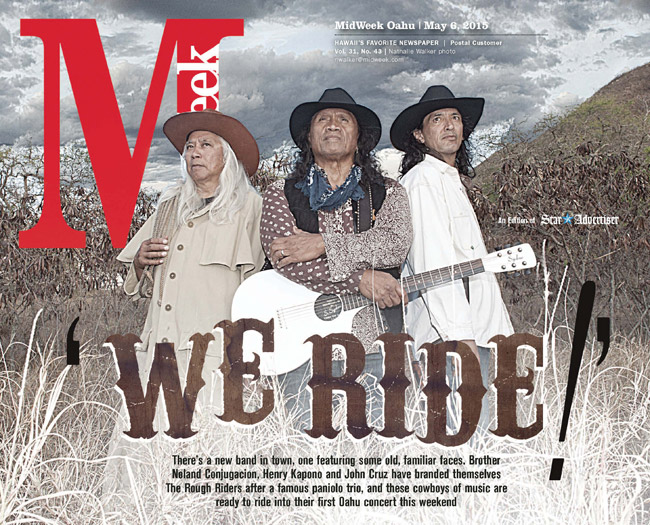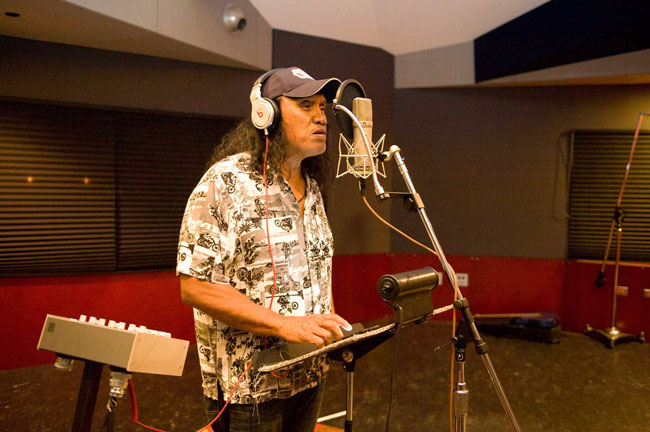We Ride!
“People need that funnel of hope,” Conjugacion says. “We know that’s our job, from so many years of playing benefits. We’ve had our glory performances too. But we’re kind of at a period in our lives where we can just go and throw our hearts out there, give it our all for a good cause.”
In giving their everything as musicians over the past four decades, the men have carved out quite a legacy. Kapono is a Grammy-nominated artist recognized more for forming one-half of the C&K duo, which produced such powerful hits as Friends, Sailing and Highway in the Sun. His annual Back in the Day concerts are still hugely popular, as are his weekly afternoon gigs at Duke’s on Waikiki Beach.
Conjugacion pioneered the entire Jawaiian scene and wrote a number of feel-good songs rooted in Hawaiian slack key and swing, including Coconut Girl and Pua Lane. Additionally, he’s operated Hawaiian Inside Tracking for the past 20 years, a program that allows adults and keiki the opportunity to learn traditional Hawaiian survival skills.
Meanwhile, Cruz is a Grammy Award-winning artist who hails from one of Hawaii’s great musical families (his father is Ernie Sr., the country western musician known as “The Waimea Cowboy,” and his brother, Ernie Jr., was a member of the popular Ka‘au Crater Boys), and is credited with a number of hits as a soloist, including Island Style, Shine OnandSitting in Limbo.
Interestingly enough, each of them chose to go elsewhere to find his place in the music frontier. Or, as Conjugacion eloquently puts it, “We had to get the hell out of Dodge … go beyond the reef.”
Kapono discovered his voice playing music for soldiers deep in the jungles of Southeast Asia during the height of the Vietnam conflict. Conjugacion spent five years in L.A. and Seattle taking his shot at music greatness. And Cruz honed his craft on the East Coast over the course of 13 years, playing in pubs from Greenwich Village to Martha’s Vineyard while attending University of Massachusetts on a scholarship.
Eventually, the Islands’ pull was too difficult to ignore.
“Every time I came back home, I had this deep appreciation for Hawaii,” says Conjugacion. “For me, it was always ‘How can I communicate my Hawaiianess to the people on the Mainland, and how can I communicate my worldliness to the Hawaiians here.'”
Forming a supergroup isn’t the easiest or smartest thing to do.
Often, egos get in the way and muck things up. But in The Rough Riders’ case, they didn’t start out trying to be a group; rather, they just wanted to be friends. “We had to see if there was something more than just the music between us,” says Cruz.
During their first gathering at Sandy Beach last summer, no songs were played. Oh, the men brought their instruments along, but as Kapono recalls, “All we did was talk story, you know? Just wala‘au.”
What the men discovered was they shared commonalities in areas such as hunting, fishing and surfing. Soon, more talk-story sessions were scheduled, and when the time was right, the guitars naturally surfaced and they began to play.
“Had we just jumped on the music, I don’t know where this would have gone,” says Kapono, the oldest of the bunch and the one who initially approached the others about forming a supergroup. “But getting to know each other as individuals first helped us to connect.”
Eventually, the time came to officially brand this partnership, and the musicians looked no further than the inspirational story of paniolo Ikua Purdy, Archie Kaaua and Jack Low — the Big Island trio that shocked the cow country world back in 1908 by capturing the Frontier Days celebration in Cheyenne, Wyo. — for their name.
Kapono believes the paniolo story was particularly important because it helped break down misconceptions of the kanaka to Mainland cowboys.
“At that time, (the attitude) was like, ‘What is a Hawaiian?'” he says. “This was way before Don Ho, before even Duke Kahanamoku, so these guys were unknowns, and I think the cowboys were probably laughing at them. They were given junk horses to use for the competition, but these paniolo wound up training the horses there and winning. Afterward, they got a standing ovation, and then all of a sudden, Hawaii is on the map.
“So to me, these were the people we needed to identify ourselves with and represent.”
“Those paniolo persevered; they were determined and had skills,” Conjugacion adds. “I like to think we’re the same way. So, we’re kind of like cowboys of music.”
The Rough Riders have spent the last few months laying down tracks for their much-anticipated debut album. Besides the contribution of original compositions from each of the band’s members, two classic cover tunes will almost assuredly make the final cut: Kilakila Na Roughrider, the traditional song that pays tribute to Purdy, Kaaua and Low; and Waimanalo Blues.
Naturally, The Rough Riders have put their own spin on these time-honored numbers. Last week, for example, they gathered in studio to put the finishing touches on Waimanalo Blues.
During playback of the instrumental portions of the song, they listened carefully to the driving rhythms of their acoustic guitars and Kapono’s accompaniment on electric guitar, and when the instrumental groove felt right and true, you could almost hear the trio communicating telepathically to each other, “Let’s ride.”
And so they got down to business. Situating themselves in separate vocal booths, the men slid up close to the studio mics and began singing and emoting in the only way they know how to: as if their very lives depended on it. And when their voices combined for the “ah-ah-ahhh-ah!” refrain — their own attempt at modernizing the song with a majestic three-part harmony — the beloved tune suddenly turned into a new and exhilarating experience. It was as if these artists had transported themselves back in time, and were all sitting in saddles as they and a hundred galloping horses raced along the rolling hills of Waimea, or across the plains of Cheyenne, with the wind in their long hair, the hypnotic rhythm of hoof beats in the air and the magic of being paniolo everywhere.
“Our music is a lot like riding a horse,” Kapono says. “Wherever it goes, it goes.”
“Yep. Always forward,” Conjugacion adds. “But just hold on tight.”
Right on, Rough Riders. Ride on into the Great Wide Open.







